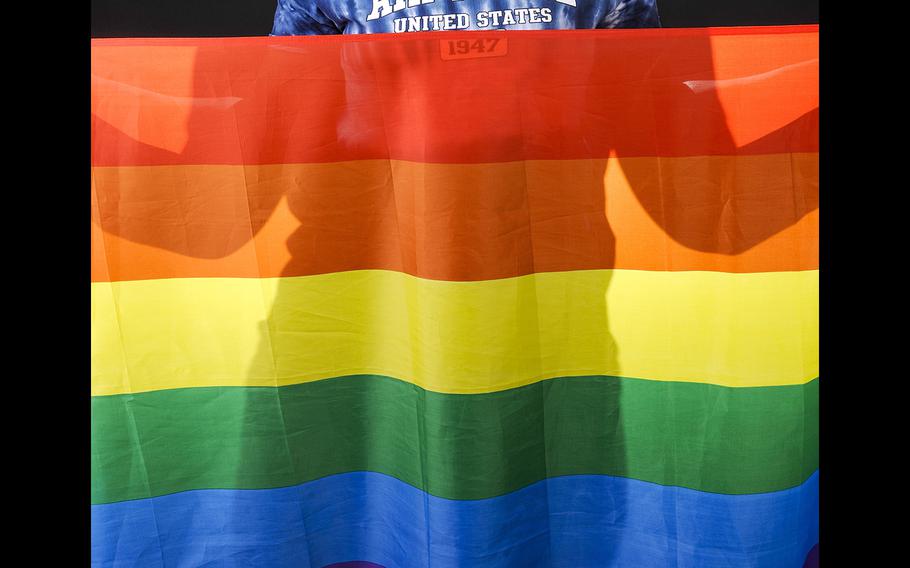
A U.S. airman holds a rainbow flag for Lesbian, Gay, Bisexual, and Transgender Pride Month during a June 12, 2014, event at Eielson Air Force Base, Alaska. (Ashley Nicole Taylor/U.S. Air Force)
WASHINGTON — The requirements of hormone therapy might make some transgender troops unable to deploy on military missions and affect the military’s ability to fight wars, the chairman of the House Armed Services Committee said Thursday.
Rep. Mac Thornberry, R-Texas, said the historic policy change last week allowing those servicemembers to serve openly is threatening to redefine what it means to be ready to fight and blamed President Barack Obama for pressuring the military to adopt it without adequate planning.
Thornberry, who holds the gavel of the most influential military committee in the House, had come out against the Pentagon policy shift when it was announced June 30 by Defense Secretary Ash Carter. But he elaborated on his concerns over transgender medical readiness and the ability to deploy during an appearance at the conservative Heritage Foundation think tank in Washington, D.C.
“At least some number of transgender people require hormone therapy, which requires regular lab tests and also requires refrigeration,” Thornberry said. “If you have those requirements, whatever your situation, you have been non-deployable.”
Estimates over the number of transgender troops serving vary from 4,000 to 15,500. After a year of consulting and planning, Carter said the ban on them serving openly was immediately lifted, similar to moves in recent years to allow gay servicemembers and fully integrate women into all combat roles.
In October, the military health care system will begin providing transgender troops all care deemed medically necessary for gender transition, including hormone treatment and gender reassignment surgery. The Pentagon estimated the care will cost about $4 million to $14 million annually.
Thornberry said the move to allow the ongoing medical care raises questions over whether the military is redefining troop readiness, which is the ability to go to war when called upon.
“That is just one example of how I don’t think they thought through all of the issues, concerns, ramifications of this policy,” he said. “There was pressure obviously from the White House to do it, and I worry about having something other than national security drive the train when it comes to our military.”
His response came after a chaplain’s group raised concerns about transgender troops during the Heritage event.
“Are moms and dads going to be encouraging their young men and women to enter a military where as of last week, according to senior Pentagon officials, there will now be mixed genitalia, as they put it, in military showers, living facilities and the two-person barracks, and bathrooms?” said Ron Crews, a retired colonel and executive director of the Chaplain Alliance for Religious Liberty.
Crews told Thornberry that the open service has become a top concern for his group and he pressed the congressman on options for rolling it back.
“Why is the military pushing this and is there any legislative remedy to stop this push, because I’m really concerned about the impact on recruiting that this is going to have on young men and women considering the military in the future,” he said.
During the Pentagon announcement, Carter said the change would allow the military to recruit from 100 percent of the country’s population to find the best troops for the all-volunteer force.
“Our mission is to defend this country, and we don’t want barriers unrelated to a person’s qualification to serve preventing us from recruiting or retaining the soldier, sailor, airman, or Marine who can best accomplish the mission,” Carter said.
The Pentagon said it will not begin actively recruiting transgender troops for another year. During that time, many details of the new policy including medical treatment must still be worked out.
Meanwhile, many Democrats in Congress, including Rep. Adam Smith, who is the ranking member on the House Armed Services Committee with Thornberry, also hailed the transgender policy as a move to a fairer and more inclusive military.
“These changes will involve a very small number of individuals serving in the armed forces, on the order of 0.1 percent of the approximate total of 2 million active and reserve members in the U.S military,” Smith said at the time. “The evidence indicates that modernizing our policy in this way will not meaningfully reduce readiness.”
tritten.travis@stripes.com Twitter: @Travis_Tritten